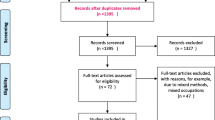Abstract
Most organizations and/or their sub-units like ethics programs want to acquire the knowledge, skills and other resources needed to achieve their goals efficiently and effectively. Thus, they want to acquire or develop needed “capacity.” But there are pre-conditions to building capacity that are often overlooked or forgotten, but which nevertheless, must be in place before capacity can be developed. This essay identifies these pre-conditions and discusses why they are necessary before attempts are made to enhance the capacity of any ethics program. The essay closes by offering a series of questions that ethics program leaders/and or members can asked themselves to assess whether or not these pre-conditions exist.
Similar content being viewed by others

References
American Medical Association Journal of Ethics. http://virtualmentor.ama-assn.org/.
American Society for Bioethics and Humanities. (2009). Core competencies for health care ethics consultation. www.asbh.org/publications/pdfs/CCUpdateNov09.pdf.
Azar, S. T., & Read, K. N. (2009). Parental cognitive disabilities and child protection Services: The need for human capacity building. Journal of Sociology & Social Welfare, 26(4), 127–151.
Bioethics Discussion Blog. http://bioethicsdiscussion.blogspot.com/.
Collins, J., & Porras, J. (1994). Built to last: Successful habits of visionary companies. New York: Harper Collins Publishers.
Condell, S. L., & Begley, C. (2007). Capacity building: A concept analysis of the term applied to research. International Journal of Nursing Practice, 13(5), 268–275.
EC Web: A quality improvement tool for ethics consultation. www.ethics.va.gov/integratedethics/ECWeb.asp.
Hill, C. W., & Jones, G. R. (2008). Strategic management (7th ed.). Boston: Houghton Mifflin.
Jaques, E. (1951). The changing culture of a factory: A study of authority and participation in an industrial setting. London: Tavistock.
McKinsey & Co. (2001). Effective capacity building in non-profits. www.vppartners.org/learning/reports/capacity/assessment.pdf.
Rouse, W. B., & Morris, N. M. (1986). On looking into the black box: Prospects and limits in the search for mental models. Psychological Bulletin, 100, 349–363.
Senge, P. (1990). The fifth discipline: The art and practice of the learning organization. New York: Doubleday.
Stacey, R. D. (1996). Complexity and creativity in organizations. San Francisco: Berrett-Koehler Publishers, Inc.
Werhane, P. (2008). Mental models, moral imagination and system thinking in the age of globalization. Journal of Business Ethics, 78, 463–474.
Acknowledgment
We are grateful to Sue McCoy, M.D. for her advice and comments as we prepared this manuscript.
Author information
Authors and Affiliations
Corresponding author
Rights and permissions
About this article
Cite this article
Mills, A.E., Rorty, M.V. The Pre-conditions for “Building Capacity” in an Ethics Program. HEC Forum 22, 287–297 (2010). https://doi.org/10.1007/s10730-010-9147-0
Published:
Issue Date:
DOI: https://doi.org/10.1007/s10730-010-9147-0



